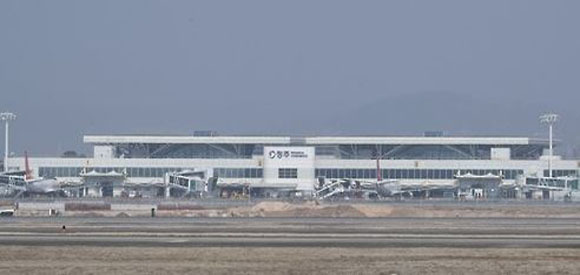CHEONGJU -- A South Korea's regional airport heavily dependent on Chinese tourists is facing tough times after being hit hard by Seoul's diplomatic row with Beijing over the deployment of an anti-missile system, industry sources said Sunday.
The Cheongju International Airport, which used to have nine out of 10 international passengers coming from its China routes, has not seen flights to major Chinese cities since March when Beijing banned the sale of group travel packages to South Korea in retaliation for the deployment of an advanced US Terminal High Altitude Area Defense system on its soil.
The Chinese government argued the system could spy on its military though Seoul has said it is purely aimed at defending against missile threats from North Korea.
The Cheongju International Airport, which used to have nine out of 10 international passengers coming from its China routes, has not seen flights to major Chinese cities since March when Beijing banned the sale of group travel packages to South Korea in retaliation for the deployment of an advanced US Terminal High Altitude Area Defense system on its soil.
The Chinese government argued the system could spy on its military though Seoul has said it is purely aimed at defending against missile threats from North Korea.

The number of flights on its Chinese routes plunged to around 50 in July from 198 in January. That of passengers on its international routes fell to 13,000 last month, only one fifth of the corresponding figure a year earlier, according to the airport.
In a bigger concern for Cheongju airport, the number of flights and passengers could fall further as Koreans increasingly opt to travel overseas on long-haul routes, not on domestic routes, during the upcoming Chuseok holidays which falls in early October, the airport said.
This year, the Korean version of Thanksgiving holidays could last up to 10 days if the government makes Oct. 2 a temporary holiday as part of efforts to boost spending.
South Korea is expected to report a record tourism deficit worth $15 billion (about 17 trillion won) for the whole of 2017, more than doubling from $6 billion a year earlier, according to government data.
Foreigners are projected to spend 14 trillion won in their travel to South Korea, while Koreans are estimated to spend a whopping 31 trillion won in their overseas trips, the data said. (Yonhap)




![[Herald Interview] 'Amid aging population, Korea to invite more young professionals from overseas'](http://res.heraldm.com/phpwas/restmb_idxmake.php?idx=644&simg=/content/image/2024/04/24/20240424050844_0.jpg&u=20240424200058)















